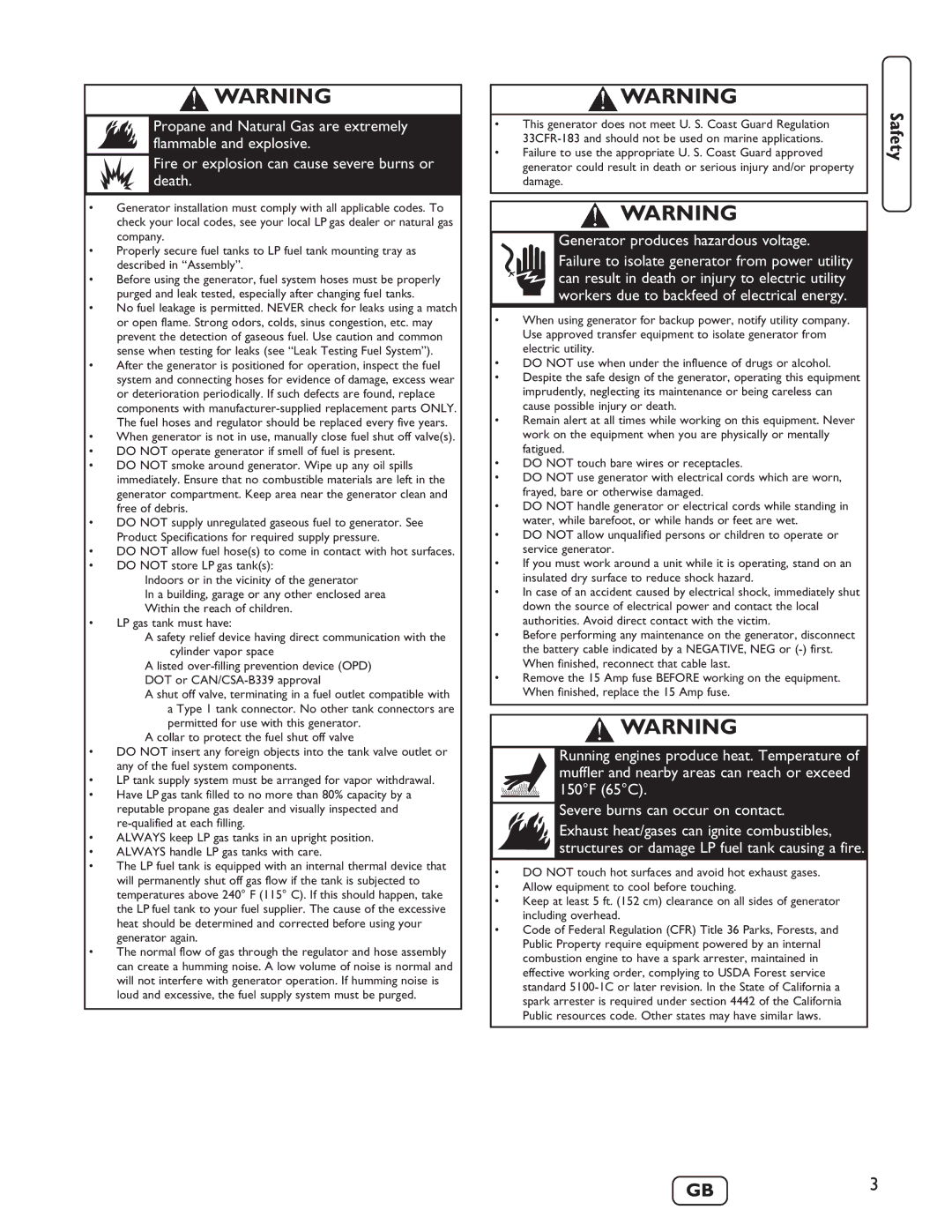 WARNING
WARNING
Propane and Natural Gas are extremely flammable and explosive.
Fire or explosion can cause severe burns or death.
•Generator installation must comply with all applicable codes. To check your local codes, see your local LP gas dealer or natural gas company.
•Properly secure fuel tanks to LP fuel tank mounting tray as described in “Assembly”.
•Before using the generator, fuel system hoses must be properly purged and leak tested, especially after changing fuel tanks.
•No fuel leakage is permitted. NEVER check for leaks using a match or open flame. Strong odors, colds, sinus congestion, etc. may prevent the detection of gaseous fuel. Use caution and common sense when testing for leaks (see “Leak Testing Fuel System”).
•After the generator is positioned for operation, inspect the fuel system and connecting hoses for evidence of damage, excess wear or deterioration periodically. If such defects are found, replace components with manufacturer-supplied replacement parts ONLY. The fuel hoses and regulator should be replaced every five years.
•When generator is not in use, manually close fuel shut off valve(s).
•DO NOT operate generator if smell of fuel is present.
•DO NOT smoke around generator. Wipe up any oil spills immediately. Ensure that no combustible materials are left in the generator compartment. Keep area near the generator clean and free of debris.
•DO NOT supply unregulated gaseous fuel to generator. See Product Specifications for required supply pressure.
•DO NOT allow fuel hose(s) to come in contact with hot surfaces.
•DO NOT store LP gas tank(s):
Indoors or in the vicinity of the generator
In a building, garage or any other enclosed area
Within the reach of children.
•LP gas tank must have:
A safety relief device having direct communication with the cylinder vapor space
A listed over-filling prevention device (OPD) DOT or CAN/CSA-B339 approval
A shut off valve, terminating in a fuel outlet compatible with a Type 1 tank connector. No other tank connectors are permitted for use with this generator.
A collar to protect the fuel shut off valve
•DO NOT insert any foreign objects into the tank valve outlet or any of the fuel system components.
•LP tank supply system must be arranged for vapor withdrawal.
•Have LP gas tank filled to no more than 80% capacity by a reputable propane gas dealer and visually inspected and re-qualified at each filling.
•ALWAYS keep LP gas tanks in an upright position.
•ALWAYS handle LP gas tanks with care.
•The LP fuel tank is equipped with an internal thermal device that will permanently shut off gas flow if the tank is subjected to temperatures above 240° F (115° C). If this should happen, take the LP fuel tank to your fuel supplier. The cause of the excessive heat should be determined and corrected before using your generator again.
•The normal flow of gas through the regulator and hose assembly can create a humming noise. A low volume of noise is normal and will not interfere with generator operation. If humming noise is loud and excessive, the fuel supply system must be purged.
 WARNING
WARNING
•This generator does not meet U. S. Coast Guard Regulation 33CFR-183 and should not be used on marine applications.
•Failure to use the appropriate U. S. Coast Guard approved generator could result in death or serious injury and/or property damage.
 WARNING
WARNING
Generator produces hazardous voltage.
Failure to isolate generator from power utility can result in death or injury to electric utility workers due to backfeed of electrical energy.
•When using generator for backup power, notify utility company. Use approved transfer equipment to isolate generator from electric utility.
•DO NOT use when under the influence of drugs or alcohol.
•Despite the safe design of the generator, operating this equipment imprudently, neglecting its maintenance or being careless can cause possible injury or death.
•Remain alert at all times while working on this equipment. Never work on the equipment when you are physically or mentally fatigued.
•DO NOT touch bare wires or receptacles.
•DO NOT use generator with electrical cords which are worn, frayed, bare or otherwise damaged.
•DO NOT handle generator or electrical cords while standing in water, while barefoot, or while hands or feet are wet.
•DO NOT allow unqualified persons or children to operate or service generator.
•If you must work around a unit while it is operating, stand on an insulated dry surface to reduce shock hazard.
•In case of an accident caused by electrical shock, immediately shut down the source of electrical power and contact the local authorities. Avoid direct contact with the victim.
•Before performing any maintenance on the generator, disconnect the battery cable indicated by a NEGATIVE, NEG or (-) first. When finished, reconnect that cable last.
•Remove the 15 Amp fuse BEFORE working on the equipment. When finished, replace the 15 Amp fuse.
 WARNING
WARNING
Running engines produce heat. Temperature of muffler and nearby areas can reach or exceed 150°F (65°C).
Severe burns can occur on contact.
Exhaust heat/gases can ignite combustibles, structures or damage LP fuel tank causing a fire.
•DO NOT touch hot surfaces and avoid hot exhaust gases.
•Allow equipment to cool before touching.
•Keep at least 5 ft. (152 cm) clearance on all sides of generator including overhead.
•Code of Federal Regulation (CFR) Title 36 Parks, Forests, and Public Property require equipment powered by an internal combustion engine to have a spark arrester, maintained in effective working order, complying to USDA Forest service standard 5100-1C or later revision. In the State of California a spark arrester is required under section 4442 of the California Public resources code. Other states may have similar laws.

